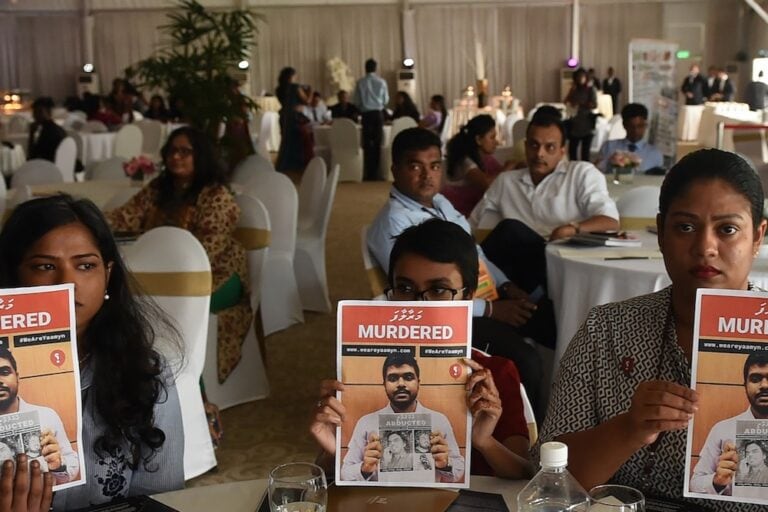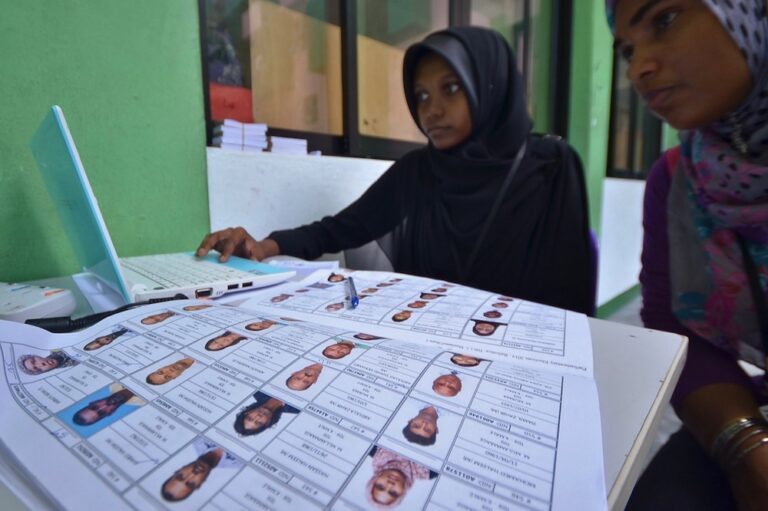RSF urges the Maldivian authorities and political parties to show full respect for journalists, including those working for media outlets that do not share their views.
(RSF/IFEX) – Reporters Without Borders urges the Maldivian authorities and political parties to show full respect for journalists, including those working for media outlets that do not share their views. Both opposition and state media journalists have been physically attacked in the past two weeks, while the head of a privately-owned TV station was summoned by the information department.
Tourism, Arts and Culture Minister Mohamed Thoyyib nonetheless assured Reporters Without Borders that the government has no intention of arresting journalists or trying to influence media content.
“Maldives is in the process of becoming one of the Asian countries that most respects press freedom but all the encouraging efforts could be jeopardized by partisan intolerance,” Reporters Without Borders said. “We urge government and party leaders to act responsibly and make press freedom a joint priority. The government also has a duty not to try to meddle in media content.”
Dhi TV CEO Yoosuf Nawal was summoned by the information department about some of its programmes on 23 July 2009, two weeks after the station received a warning letter from the government. Nawal told Reporters Without Borders that the head of the information department threatened to withdraw Dhi TV’s licence.
The authorities were upset by Dhi TV’s broadcasting of live footage of former President Maumoon Gayoom being taken in for questioning at a police station, and by a talk-show in which an opposition party representative was the only guest.
Nawal told Reporters Without Borders, “We are required by our licence not to create any confusion in the minds of the public but, in both these cases, we just did our job of providing news and information.” Launched in July 2008, Dhi TV received its licence from the previous government headed by Gayoom.
Thoyyib, the tourism, arts and culture minister, accused Dhi TV of being “manipulated” and told Reporters Without Borders that the authorities had a duty to ensure that it respected the terms of the licence it had been given.
Meanwhile, members of the opposition Dhivehi Rayyithunge Party assaulted reporter Ibrahim Rasheed of state-owned Television Maldives as he was covering former President Gayoom’s arrival at the police station on 20 July. They also prevented other journalists from working freely.
Ahmed Zahir, the editor of the privately-owned daily “Haveeru,” was hit by ruling party supporters near the parliament building in Malé on 15 July. A well-known government critic, Zahir told Reporters Without Borders the police made no serious attempt to identify those who attacked him although the assault was filmed by a state TV crew.
A court has meanwhile decided to proceed with a criminal defamation prosecution against Abdul Hameed Abdul Kareem over an article in “Manas,” a magazine he used to edit. He is facing a possible jail sentence. The Maldives Journalist Association condemned the decision while appealing to journalists to show more respect for professional ethics.
The government and parliament need to work together to quickly decriminalise press offences and adopt media laws that comply with international standards.
In a 19 July letter to President Mohamed Nasheed, the Maldives Journalist Association also voiced concern about a government decision not to publish announcements in the privately-owned press any more, while broadcast media representatives have said the high annual cost of the licences issued by the previous government is causing them financial problems.
Thoyyib told Reporters Without Borders the government has “no intention of arresting journalists, taking them to court or withdrawing licences as was the case with the preceding government” and he confirmed that a new broadcasting bill was on the point of being finalised. “It will be fair and designed to guarantee the freedom of radio and TV stations,” he said, adding that the government would scrap the licence point system introduced by the previous government.
Reporters Without Borders wrote to President Nasheed when he took office in November 2008 urging him to turn Maldives into a “model of press freedom in Asia” and asking him, in particular, to decriminalise press offences.


